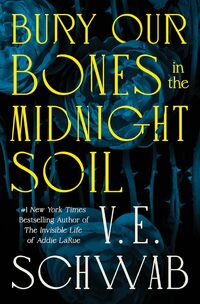 BURY OUR BONES IN THE MIDNIGHT SOIL |
 Fall headfirst into July’s hottest stories—danger, desire, and happily-ever-afters await. |

Purchase
Lulu.com Self-Help, Non-Fiction Inspirational Excerpt of When Death Comes a Knockin' by Vanessa Alexander JohnsonDeath! Just the mere thought or mention of this simple five-letter word, especially used in the context of the loss of human life, immediately invokes images of something cold, dark, spooky, and scary enough to cause the hairs on your neck to stand straight up! Only after you have experienced the loss of someone close to you will you be fully able to comprehend the emotional depths of loss. I am typically a warm and loving individual, not bleak and morbid by nature. Unfortunately, this is what death and loss can do to a person's spirit. The dreary bleakness is due to the circumstance of death. By no means is it a reflection on the legacy of our departed loved ones. We will go out of our way to not think about death in an attempt to avoid dealing with this horrific event. Prior to the loss of my mother and son in 1994, I avoided the topic of death like the plague. Unfortunately, death and I are not strangers. We have met on numerous occasions. I feel we should be on a first name basis. Every second of every minute someone's father, mother, sister, brother, grandmother, grandfather, son, daughter, aunt, uncle, wife, husband, cousin, fiancé, friend, and/or significant other dies. The causes of these deaths range from terminal illness to accidental to malicious intent. Whatever the cause, the outcome is the same. A loved one is no longer among us, and it hurts like hell. If you have never experienced the loss of someone close to you, you may find yourself in a state of panic and shock; a state of grief, over-flooded with emotions and feelings that can make you truly feel like you are losing your mind. When we lose a loved one, oftentimes we ignore our feelings and emotions; submerge them within our psyche instead of admitting we have been dealt a terrible blow. Many people are afraid to admit they have a problem coping with many of life's problems including death, therefore they will not admit they need help because to do so may indicate a sign of weakness. Some people believe if they allow themselves to think about death, they may have to deal with all of the baggage that goes along with it. This baggage includes fear. Fear that we might be left alone to face the world and all of its problems. It is this fear that can force us to think about our own mortality or the mortality of our love one. This baggage also includes pain, but not the ordinary pain you feel from a cut or other physical injury to the human body. I am talking about pain so excruciating emotionally that it cannot be put into words. I am talking about a pain that does not go away by simply taking a pill. It is a pain so intense you think it will last forever. This baggage includes anger. Oftentimes we do not know exactly whom we are angry with, therefore any and everyone around us may fall victim to this anger. Sometimes we turn that anger towards ourselves. There is nothing simple about death. Regardless of how many times we are faced with the loss of a loved one, many people never get used to dealing with death. Even if you have managed to overcome the loss of a loved one through death in the past, it is not to say that you will react the same way the next time you are faced with death. Death can be like the old saying, “The straw that breaks the camel’s back.” When dealing with death, that one straw may cause the proverbial wind to be knocked out of us. To experience death is like being sucker punched. You don’t see it coming, and you are stunned and shocked when it hits you. Even if the death is expected, if you think you have prepared yourself for when it finally happens, think again. There is no amount of preparation that can prepare you fully for the death of a loved one. It is only when you are hit with the reality that your loved one is no longer here, when you cannot see or touch them like you use to, when you cannot tell them you love them like you use to, when they cannot tell you they love you like they used to, is when their death may become too much for the mind to absorb. It is the dark cold bleak description that we have of death that is probably the main reason why so many of us shy away from talking about it. But, by not talking about death, does that prevent death from happening? For the life of me I wish it did. Many people have revealed they have a fear that if they talk about death, it just might happen to someone close to them so they avoid the subject. Some people feel that if they do not talk about death, they will not have to deal with it. They are not going to look for trouble if trouble is not looking for them. Death is something we must all face at one time or another, as death has been occurring since the beginning of time and occurs in all families. But to say we must face death does not mean that we must accept it, become comfortable with it as a natural part of our lives. Death is a natural occurrence, in that it occurs daily and has been occurring since the sins of Adam and Eve. The idea of seeing someone who was once full of life in the lifeless state of death just does not register naturally in the mind. I have talked with many of my colleagues. Some of them have admitted that they could not remember ever losing someone in their immediate friend or family circle. I envy them but I also pray for them because they have no idea of what they are in for when they are faced with death and losing someone they love. When death touches us that close, how do we handle it? The answers to this question are so multi-faceted, and there is no one or correct answer. The loss of a loved one often times is that final straw in life that can forever change your tomorrows. When I lost my mother and son, I searched for answers. I felt the need to connect with other people who had lost a loved one, to be comfort by them, a form of validation that I was not alone in my pain. That search led me to books. Although there were many published books that dealt with the subject of loss and grief, they did not comfort me. Much to my dismay, the information contained in those books was written from professional points of view and not from personal experience. As such, I felt the pain they described was different from the pain I was experiencing because I had lost my mother and my son. Dissatisfied with what was available in bookstores, I decided to journal my experience so others would know that they are not alone in their grief. What began as a seven- page essay in 1995 has evolved into this book you are now reading. It is my hope and prayer that by sharing my experiences with other I will help them in some way, even if it is only in the knowledge that they are not alone after losing a loved one. I also pray that this book will serve as guide to those who are grieving, confirming that they may do so at their own pace through areas of shock, expressions of grief, and helps them to deal with questions, doubts, guilt and fears over the loss of a loved one. By facing overwhelming emotions of loss during grief people wonder if they will ever feel okay again, thus leaving them depressed, angry or even ashamed when their grief doesn’t disappear quickly or happen in neat, orderly stages. In this book the person grieving is shown how to take small steps towards the recovery process. In the end, this book will help the survivor understand what they are going through and serve as a How-to guide so they can reach the final stage of Acceptance in the grief process. Excerpt from When Death Comes a Knockin' by Vanessa Alexander Johnson |
|
| |||
|
||||



 © 2003-2025
© 2003-2025